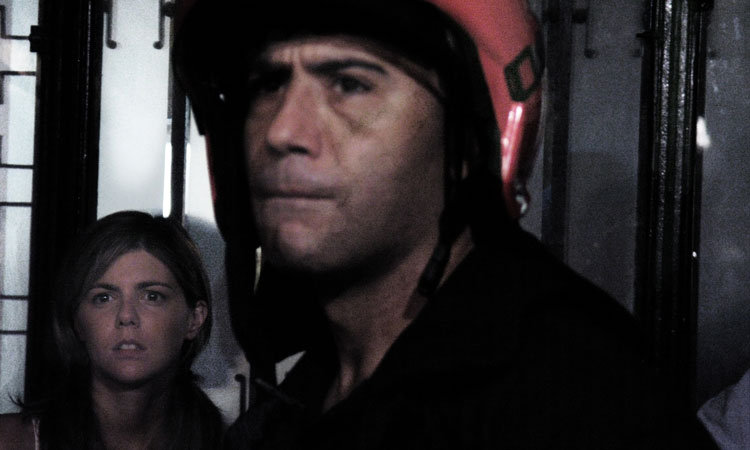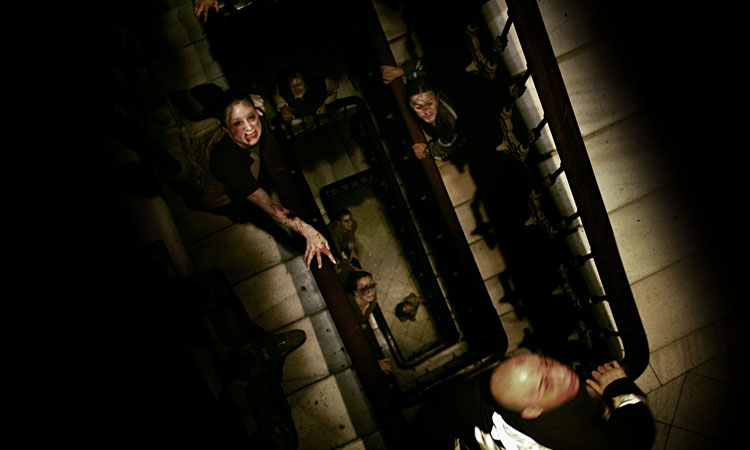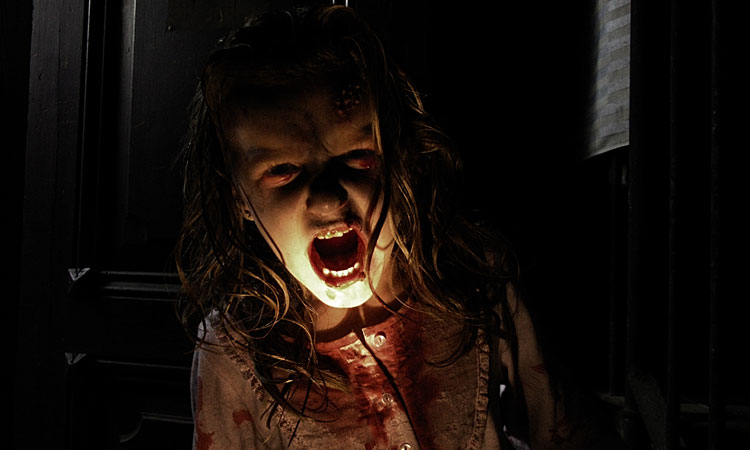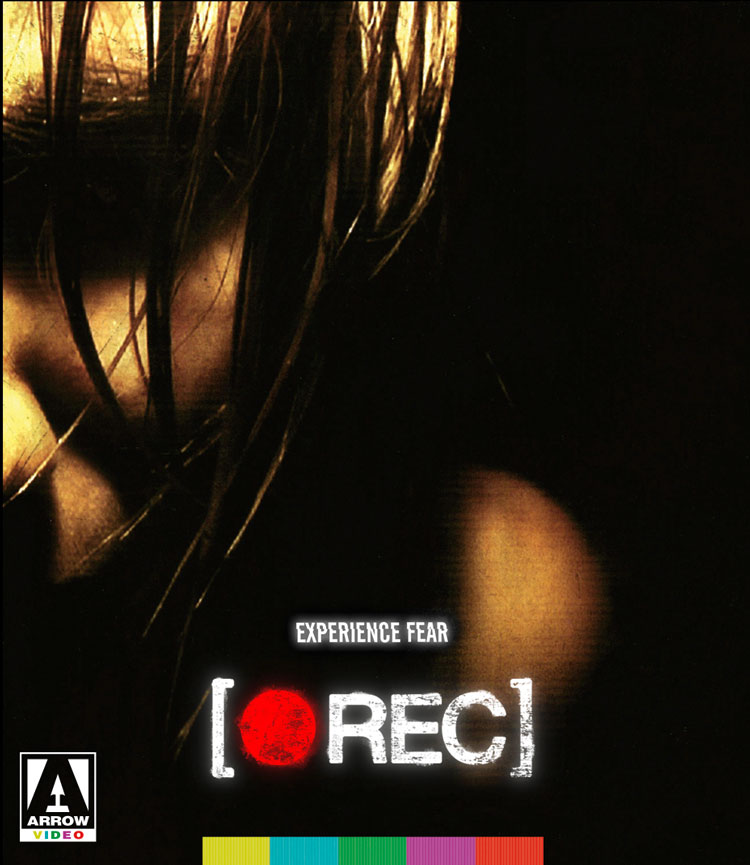“We were talking about how it would be to make a horror film that we can write quickly, shoot quickly and release quickly,” Paco Plaza remembers when we ask how his and co-creator Jaume Balagueró’s zombie horror tale [REC] came to be unleashed on viewers back in 2007. “Jaume and me met when we made short films in the Nineties and we were missing that feeling of freedom, of immediateness, of the craziness of doing something just for the fun of it. I think that was the spark that blew our minds to say: ‘Okay, let’s do a zombie film. Just very cheap. Let’s shoot it really quick’. I think it came from trying to get back that feeling of freedom.”
The pair also had a great idea for their ‘quick zombie film’. [REC] follows news reporter Ángela (played by Manuela Velasco) and her cameraman, the never seen but always-constant Pablo (Pablo Rosso) who are making a ‘real-life’ TV show about the fire department. One fateful night, Ángela and Pablo follow the firefighters on what seems to be a routine call out to an apartment building in Barcelona.
Unfortunately, the situation is anything but routine as a deadly virus spreads among the building’s occupants, turning them into bloodthirsty cannibals; escape is impossible as the government has surrounded the building to prevent the virus from spreading beyond it, and the pair continue to record the events that unfold inside, of which the film itself is the final result.

“I remember the idea was to use this narrative of a TV report to explain the story,” Jaume Balagueró adds. “Not the stories we are used to seeing on TV, but a zombie movie with blood and be completely fantastic. The idea to mix these opposite concepts – the real live report style of shooting with a zombie movie – we found it really interesting and exciting and we decided to go in!”
The pair wanted to make the film seem as real as possible, hiring actors who could put across that real-life feeling: “[For] casting the neighbours of the building, we wanted them to be real neighbours. People you can recognise; [the] Chinese immigrants, the old couple… people that really live in my building!” Paco says. “We wanted to keep it very, very real. We wanted the film to be scary and to have really good jump scares because, for us, it was part video game, part roller coaster. Like this haunted house you get in a fair. So we wanted to have intense moments, but we wanted to keep it very very real.
“It’s not Resident Evil where there is a high tech laboratory. It’s happening in your house, in your place, in a building that is so typical of Barcelona. The people [are] normal people being confronted to an exceptional situation.”
“Yeah, the most important thing for us was credibility,” Jaume adds. “The credibility in the way we were shooting, the credibility in the acting of the actors, the credibility in the place, the location. Normally you would say ‘oh, let’s locate that story in New York or whatever’ but the idea was to be realistic, and the most realistic thing for us and for Spanish audiences, [is this] typical neighbourhood in Barcelona.”
Indeed, the movie is set in a typical Barcelonan apartment block complete with a very impractical winding stairway (useless when escaping zombies, great for falling to your un-death), with the entire story being told through Pablo’s first-person perspective; all shaky-cam and cannibalistic monsters hiding just out of frame.

This first-person POV style of filmmaking inevitably caused [REC] to be compared with ‘found-footage’ movies such as The Blair Witch Project which was released eight years before. However, those comparisons are not overly correct, according to Paco: “[[Rec] is] not exactly found footage,” he says. “[It uses] the TV language. I think one thing that makes [Rec] different from other films like The Blair Witch Project or Cannibal Holocaust is that we are watching the action in real-time. I think that that makes it different and more intense because we wanted the people to experience the film at the same time it develops in front of their eyes.”
Though perhaps not a direct comparison with The Blair Witch Project, a trait it shares with that particular horror is that both films were successes upon release. The mixture of sweat-inducing claustrophobia due to the potent mix of that shaky first-person camera viewpoint and a one-building setting ensured audiences were enthralled with [Rec]. Soon word was spreading about this small, independent Spanish film that would scare you witless.
“When [REC] was released, it had a big impact,” Jaume remembers. “The market was different and the movies when they were released were more important. People went to theaters to see the movie and to share the experience with other people and that’s why the movie was so funny and scary. That’s what happened at that point 15 years ago. If the movie was released today on TV, by Netflix or another platform, I’m sure it will be different. I think the movie is now remembered and stays in peoples’ minds because of the success of this release in theaters, in people sharing the experience. [That] was something very powerful for the first round.”
There are plenty of reasons why [REC] proved so popular but a possible reason why it works as a great genre film is because it’s been made by genre fans who knew what they wanted to see in a horror film. “We are fans,” Jaume nods. “When we make a movie together (or I suppose when we are making movies separately, in my case), I always think ‘what I would like to see at this moment or what I would like to experience?’. I am a fan, so I’m working for myself, but at the same time I’m working for others. I know I’m exactly the same as the usual audience, so it’s perfect for me. I am a fan so I work for myself, for a fan.”
“Watching horror films is very good for your health,” Paco laughs. “Sometimes through a horror film you can understand a fear you have within and you can really express it. Sometimes you watch a film and you feel something that can’t be expressed by words. I think what you want to see when you go to a theater or when you press play on your remote is just to be thrilled. It’s to get touched by the film, not to feel indifferent. I think horror films help us to deal with our own fears and our concerns.”

In fact, [REC] hit so close to home with horror and film fans alike that viewers were soon crying out for more – a plea that has been answered with a plethora of sequels. Paco and Jaume returned for the sequel in 2009, [REC] 2, which portrays the events that immediately follow the end of the first film and sees the return of actress Manuela Velasco as Ángela. Then, three years later, Paco single-handedly took on directing duties for the third installment of the series with [REC] 3: Genesis and finally in 2014 we saw the conclusion of the franchise with [REC] 4: Apocalypse, directed by Jaume and starring Velasco again.
“The franchise thing is something that just happened in a way,” Paco laughs. “We just made one tiny film and before we knew it, it was globally known. It was very successful and they kept asking ‘is there going to be a sequel?’ and we made a sequel and it worked well. [Then] they said ‘why don’t you do some more?’ so it was not something planned from the beginning, it was something that we were improvising in a way!”
You know you have a hit on your hands when our American friends decide to do a remake of your film and [REC] was no different. Titled Quarantine and directed by John Erick Dowdle (As Above, So Below), the remake not only had a slew of rave reviews of its own but it also ensured a slew of brand-new fans discovered the film that it was based on. “Yeah, I think that was a secondary effect that really helped a lot,” Paco muses. “People willing to know the original, especially in the United States where they are very reluctant to [watch] foreign-language films. I think it was very important that they made the remake so a lot of people that wouldn’t have paid attention to our film otherwise [did]. They knew this was a remake of a Spanish film and they went back to the original, so it helped a lot to the popularity of the film in the States.”
“I remember we were in Los Angeles during the shooting and they invited us to visit the shooting [of Quarantine],” Jaume tells us. “It was really exciting to see other people making something very similar [to what] you did before but in a different way. That was really exciting and interesting.”
![[REC]](https://www.scifinow.co.uk/wp-content/uploads/2021/01/Rec-02.jpg)
Now, 13 years after its remake and 14 years after its initial release, [REC] is receiving that holiest of home release treatments with a brand-new edition with Arrow Video, unleashing those zombies and shocks upon audiences once more. The latest edition not only shows David Ambit’s amazing makeup in all its horrific glory from the comfort of your home, but it proves that [REC] is still on top scaring form today.
“It has aged in very good shape,” says Paco. “Even though you may not have seen it, you know there is a zombie film called [REC]. You know this film, that it was important at some moment. The name of the film is known, it makes it interesting or intriguing to a new audience. Moreover, I think the film still works when you watch it.”
For its creators, who didn’t even think the movie was going to be released, let alone that we’d still be talking about it years later, discussing the film is still a pleasure and a shock: “It’s been an amazing experience because, imagine that when we shot the film, we didn’t know if it was going to be released,” laughs Paco. “Least of all that we’ll be talking about it 15 years later. It’s something that really overcame any expectation if we had any. It’s very satisfying [that] people who were kids when we shot the film are now enjoying it. I think that’s the most you can aspire to when you make a movie – that it is meaningful to someone through time.
“Nowadays, through Netflix and that kind of content platform, it’s like the film comes out and two weeks later it doesn’t exist at all. It’s a sign of the times is that films are less and less meaningful so to have the chance to talk about the film we made when we were very young… it’s surprising and amazing.”
[REC] is out on Blu-ray now from Arrow Video and is available on Arrow’s streaming service ARROW.
